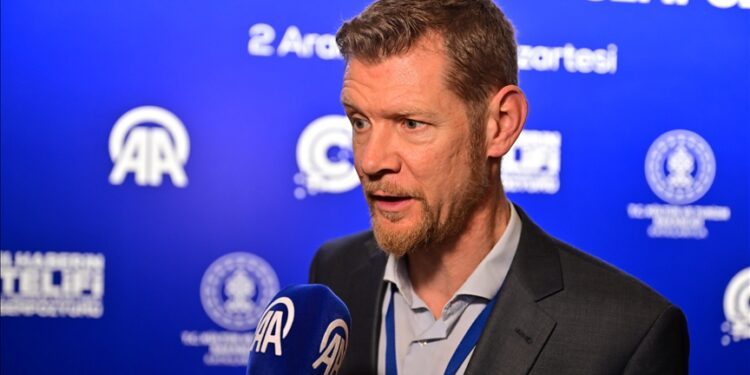ISTANBUL
Businesses face an urgent need to balance innovation, ethical responsibility and evolving copyright regulations as the digital era transforms industries worldwide — a challenge underscored by a renowned legal scholar.
Henning Grosse Ruse-Khan from Cambridge University’s Faculty of Law, shared insights into those pressing issues in an interview with Anadolu.
His reflections underscored the critical need for balance and foresight in managing copyright challenges, particularly in the context of emerging technologies like artificial intelligence (AI).
The interview took place during the II. Symposium on News Copyright and Artificial Intelligence in Media, organized by Anadolu and Bogazici University in Istanbul with contributions from the Turkish Ministry of Culture and Tourism.
Held at the historic Albert Long Hall on Bogazici University’s South Campus, the symposium brought together industry professionals, lawyers, academics and technology experts.
It aimed to address the legal, ethical and technological challenges posed by digitalization in media.
Discussions focused on the effect of digitalization on media copyrights and explored opportunities and risks AI presents in news production processes — a timely backdrop for Ruse-Khan’s insights.
Balancing innovation, compliance
When asked about the key elements of a successful digital business model, Ruse-Khan highlighted the importance of understanding the legal framework.
“If you’re more interested in compliance with existing rules and regulations, I think you would want to carefully, by means of due diligence, assess what rules they are, how they might impact on your business, and then draft and come up with a business model which respects those existing mechanisms,” he said.
While some companies, like Facebook in its early days, adopted a “move fast and break things” philosophy, Ruse-Khan emphasized that aligning innovation with compliance is not just prudent but necessary for sustainable success.
He noted the dynamic nature of legal regimes, particularly in the digital realm.
“We’ve seen quite a lot of movement of legal regimes being updated and modified to accommodate the business model,” he said, urging companies to proactively adapt to the evolving regulatory landscape.
Copyright vs. freedom of speech
The intersection of copyright protection and freedom of speech presents significant challenges. Ruse-Khan warned that copyright enforcement could sometimes limit freedom of expression.
“If the platform takes down content without sufficient evidence, that can inhibit freedom of speech, it can limit access to information,” he noted, adding that the lack of a universally enforced human rights framework exacerbates the issue.
Platforms like YouTube and Facebook have attempted to balance those rights, often relying on jurisdiction-specific concepts such as fair use.
Ruse-Khan cautioned, however, that such efforts are inherently normative.
“That balancing in itself is a very sort of normative exercise, it’s driven by policy,” he said, stressing that platforms wield substantial power in determining how human rights are exercised.
AI disruption
The proliferation of AI-generated content has disrupted traditional copyright frameworks, creating new challenges for regulators and creators. Ruse-Khan pointed out that AI training relies heavily on copyrighted materials, which raises questions about fair compensation.
“For AI to exist in the form as we know it with ChatGPT and other models — that already presumes that AI has been able to ingest all these copyrighted materials,” he said.
The implications for creators and industries are profound.
“Many types of copyright-based business models might well not continue to operate if there is a substitute or an alternative where the same material or similar content is generated by AI,” said Ruse-Khan.
While lawsuits are underway to address those issues, he expressed skepticism about equitable outcomes.
“I worry that the benefits or even compensation will only go to large publishers rather than individual creators,” he said.
Ethics in business, emerging technologies
On the ethical front, Ruse-Khan advocated for businesses to embrace long-term, socially responsible strategies.
He cited Google’s early motto: “Do no evil,” as a guiding principle.
“Any company thinking of not doing harm might, from the outset, want to think about what it actually means for their own services, how they impact on others, what kind of potential harm they might create,” he suggested.
Collaboration, though challenging in the current competitive environment, offers a path forward.
“If there is the possibility for collaboration, for example, trying to involve those whose interests and concerns are affected, ideally, that would be something,” he said.
While acknowledging the difficulties, Ruse-Khan urged businesses to prioritize ethical considerations for long-term sustainability.
“It’s also for the business’ own sake that it has a long sustainable future rather than like something which probably is then disrupted and eventually taken over by yet another better service,” he said.






